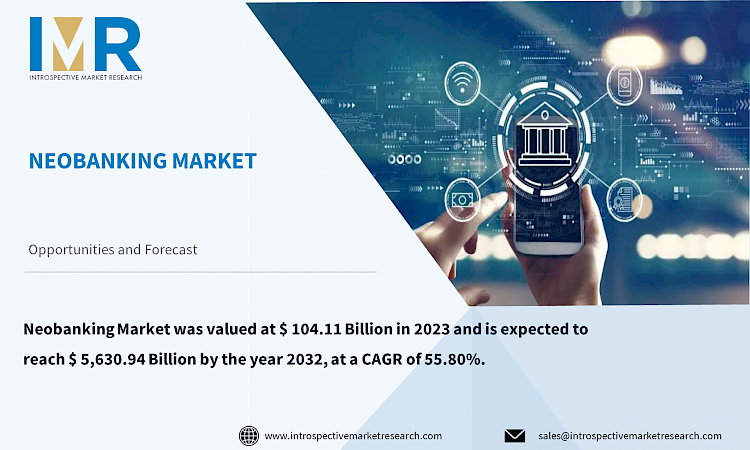Neobanking Market
According to a new report published by Introspective Market Research, titled, ?Neobanking Market by Service Type, Account Type, Application, and Region Global Market Analysis and Forecast, 2024-2032.
The Global Neobanking Market was valued at $ 104.11 Billion in 2023 and is expected to reach $ 5,630.94 Billion by the year 2032, at a CAGR of 55.80%.
Neobanking is a digital banking system that operates as an online virtual bank without physical branches. It offers efficiency through development, rate competitiveness, and unique features like micro budgeting and transaction checks. Neobanking is relevant to customers seeking a client-oriented, techie solution and young people interested in financial innovations. Many of these systems are available as banking apps or web-based services, allowing for efficient and competitive banking services.
Luxury hospitality has been sustained by family vacation time and providing comfortable and luxurious accommodations for business travelers. Hotels aim to deliver the best standard of services and facilities, including appealing interiors, delicious meals, spas, gyms, swimming pools, and laundry. The expansion of accommodation bookings online services has further fueled market growth. Marriott International's mobile application, Marriott Bonvoy, has introduced new features like improved booking options, improved ventilation, and customization of earn and redeem points options. Government regulations and policies on luxury hotel markets and taxes also influence the market. The Albanian government has altered its tourism law to ease hotel classifications, allowing 5-star hotels with a minimum investment of USD 17 million to employ at least 50% US-registered employees. Hotels with special status pay taxes for ten years with exemptions. The popularity of luxury hotel providers with superior services and better booking options is expected to strengthen the luxury hotel market position.
Neobanks, or digital-only banks, have emerged as a significant market disruptor, particularly in the Millennial and Gen Z segments. These online-only banks use technology to deliver modern, customer-focused banking services, targeting budget-conscious clients with tailored financial tools and management solutions. Their flexible and lean operating model allows them to respond quickly to market changes and customer needs, allowing them to target small, concentrated client bases and form alliances with fintech companies.
Neobanks offer openness, cost leadership, and customer orientation, rejecting hidden costs and improving business workflows. They value customer experience through chatbots and data-driven product suggestions. However, neobanks face challenges such as regulatory compliance, cybersecurity threats, and maintaining profitability. Despite these challenges, the market presents massive opportunities for neobanks to innovate in the financial services sector and disrupt incumbents. By leveraging technological advancement, prioritizing customer experience, and developing strategic partnerships, neobanks can redefine the banking experience and push for an inclusive and innovative financial system in an increasingly digital economy.
According to Neobanking, The Market is segmented into service type, Account Type, Application, and Region. By Service Type, the market is categorized into Loans, Mobile Banking, Payments, and Money Transfers, Checking/Savings Accounts, Others. By Account Type, the market is categorized into Business, Savings. By Application, the market is categorized into Enterprises, Personal). By region, it is analyzed across North America (U.S.; Canada; Mexico), Europe (Germany; U.K.; France; Italy; Russia; Spain, etc.), Asia-Pacific (China; India; Japan; Southeast Asia, etc.), South America (Brazil; Argentina, etc.), Middle East & Africa (Saudi Arabia; South Africa, etc.).
Neobanks are increasingly utilizing artificial intelligence and machine learning for personalized financial services. These startups process vast data to provide recommendations and feedback to customers, reducing human banker workload. ML algorithms are used in credit scoring, fraud detection, and risk management, enabling neobanks to offer term loan packages while minimizing risks. Future advancements in AI and ML technologies will enhance personalized customer solutions.
Neobanks can enhance their value proposition by collaborating with fintech startups, traditional financial institutions, and e-commerce platforms. This creates a single ecosystem of complementary offers, allowing for direct purchases and wealth management capabilities. A strong partnership network is crucial for long-term sustainability, gaining a competitive advantage, acquiring more customers, increasing revenue streams, and enhancing customer loyalty.
Global Neobanking Market, Segmentation
Neobanking Market is Segmented Based on Service Type, Account Type, Application, and Region.
Service Type:
The Mobile Banking segment is expected to dominate the market during the forecast period. Neobanking is a rapidly growing market in the Fintech services sector, focusing on Loans, Payments and Money Transfers, and mobile banking. Loans are automated and online, while Payments and Money Transfers are swift and borderless, utilizing technology for fast transfers. Mobile banking is the epitome of Neobanking, promoting a shift towards a mobile-dominant banking model. Checking/Savings Account services are essential for customer engagement, offering fair rates and operational flexibility. Neobanks also offer futuristic products like personal budgeting tools and investment platforms, demonstrating their adaptability to changing client demands.
Account Type:
Saving Account segment held the largest share in 2023. Neobanking is focusing on a dual product strategy targeting both business and savings accounts. Advancements in technology have led to a focus on entrepreneurship, freelancing, and small and medium enterprises. Business accounts offer expense control, invoicing, and accounting systems. Saving accounts provide customers with convenience, flexibility, attractive interest rates, and intuitive interfaces. Neobanks cater to various financial needs and employ digital approaches to serve their clients.
Region:
Europe is Expected to Dominate the Market Over the Forecast Period. Europe is expected to dominate the neobank market due to its preference for digital alternatives, technologically savvy populations, and diversified fin-tech infrastructure. The growth of inclusive regulatory measures like the Payment Services Directive 2 (PSD2) has created more opportunities for neobanks to compete with incumbents. The fragmented structure of the European banking industry, with numerous traditional banks, provides opportunities for neobanks to provide innovative, technology-oriented services. The coronavirus outbreak has pushed customers to use digital banking, emphasizing convenience, easy access, and excellent customer experience. The European neobank industry is strategically placed to capitalize on these positive market conditions and become a significant competitor in the global neobank market.
Some of The Leading/Active Market Players Are-
- Atom Bank PLC (United Kingdom)
- Fidor Bank AG (Germany)
- Monzo Bank Ltd. (United Kingdom)
- Movencorp Inc. (United States)
- Mybank (China)
- N26 (Germany)
- Revolut Ltd. (United Kingdom)
- Simple Finance Technology Corp. (United States)
- Ubank Limited (Australia)
- Webank, Inc. (China) and Other Active Players
Key Industry Developments
- In January 2024: Nu Mexico partnered with Felix Pago to launch the option to receive money from the U.S. The partnership simplified the process of sending money from the U.S. to Mexico and transformed the process of cross-border money transfers.
- In November 2023: N26 extended its product portfolio by launching an Instant Savings account. The neobank declared that customers in Germany will seek advantage from up to 2.6% interest p.a. with clear conditions and without additional costs or deposit limits involved.
Key Findings of the Study
- The market is categorized into business and savings accounts, with the savings account segment holding the largest share in 2023. Neobanks focuses on both business and savings accounts, catering to various financial needs with technological advancements.
- The neo-banking market serves enterprises and personal applications, leveraging AI and ML for personalized financial services and efficient operations.
- Europe is expected to dominate the market due to a preference for digital alternatives, a tech-savvy population, and a robust fintech infrastructure. Regulatory measures like PSD2 and the impact of the coronavirus outbreak have boosted digital banking adoption.






